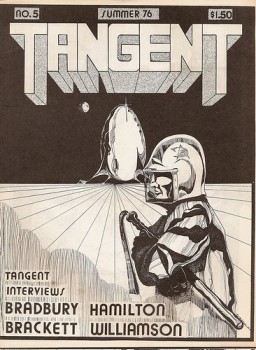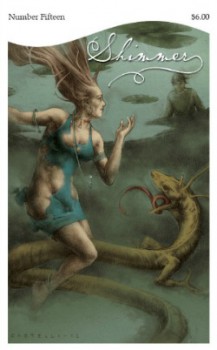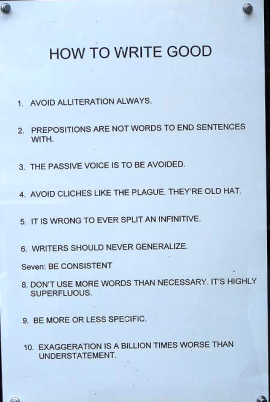Genre 2012: The Trouble With (no, not Tribbles) Pace

One should never read one’s own notices, as many a British actor, most of them knighted, have said. Does it then follow that a writer should never read reviews of his or her work? Or, for that matter, the fine print of incoming rejections?
Tangent Online was kind enough, just recently, to give my Black Gate story “The Trade” a really glowing review, but while that review made me very happy, it also gave me pause. It forced me to reflect both on my own writing and on writing in general. Why? Because of one line, short and sweet: “The pace is fast.”
And so it is, I suppose. But consider the email I got ten days after “The Trade” debuted, a note penned by David M. Armstrong, fiction editor for Witness, a literary magazine into which I’ve been trying to jam my work for about a decade. At last, a Witness acceptance, and for their upcoming spring 2013 issue! Can you guess what Mr. Armstrong said he appreciated in my story? The pace. “This,” he wrote, “was a layered and often impressively restrained narrative.”
Let’s translate, shall we, to the realm of fantasy adventure fiction. What Mr. Armstrong just said is that my Witness story, “The Last Horse in Skopje,” exhibits a pace so glacial and plodding that it would put a charging sabre-tooth to sleep at thirty paces.
Of course, Mr. Armstrong’s comment could also be read to mean I’m not being sappy, soppy, or egregiously emotional. That my prose is not purple (or Lovecraftian). That I let the story tell itself without editorializing (overmuch). All of which are surely goals, though not necessarily achievements, in any fiction I write.
But! To further muddy the waters, consider my recent rejection from Shimmer, another quality market I have yet to crack (but I will, I can feel it, I’m almost there). In their rejection note, one of Shimmer‘s associate editors told me that “…a lot of the scenes dragged where they’d have had more impact if they’d have been edited down.”
I (obviously?) feel differently, or I would never have sent the story out in the first place, but herein lies the heart of the matter: preferences in the delivery speed of fiction vary widely, and in this case, I erred badly. I got, as it were, out-paced.
in the delivery speed of fiction vary widely, and in this case, I erred badly. I got, as it were, out-paced.
Is this a question of style, of genre vs. literary fiction? Yes, to a degree. Fans of action adventure will surely clamor for the fastest possible attack, while readers of literary stories are apt to settle more deeply into their armchairs, quite prepared to “wait the story out.”
Is this, then, ultimately a question of patience? Are genre readers inherently impatient, and lit fiction fans blessed (or cursed) with an attention span sufficient to impress Deep Thought?
Possibly yes, possibly no, but clearly that equation is messy at best, since both Shimmer and Black Gate are nominally genre markets. (For more musings of mine about the divides between literary and genre fictions, please visit my previous Black Gate post, “The Ghetto Remains the Same.”)
 For my money, the heart of the issue is that each individual story demands and creates its own unique stride. “The Trade” details a quest in a hostile, primitive world; swords and sorcery abound, and so of course it fairly flies out of the gate (although part two, “The Find,” dares a more leisurely opening).
For my money, the heart of the issue is that each individual story demands and creates its own unique stride. “The Trade” details a quest in a hostile, primitive world; swords and sorcery abound, and so of course it fairly flies out of the gate (although part two, “The Find,” dares a more leisurely opening).
“The Last Horse in Skopje,” despite a violent premise in which a married couple must shoot the last horse remaining in the Macedonian capital, is stately in part because it centers on a bureaucracy, and in part because the story places great weight on the internal states of its characters.
The piece I sent to Shimmer, “True Songs of the Pennyrile,” opens with a horrific rural car accident, but from there things slow dramatically (if such an oxymoron is possible) as my heroine attempts to cobble together a new, viable life.
In each story, then, there’s a kind of architecture at work, a demand made on me (the teller) by the nature of the story itself. It’s my job to accept these demands, and if I can’t, to put the story aside and work up something else.
(Please don’t think for a moment that I’m saying I am entirely in the story’s control––that would be absurd––but if I may fall back on a metaphor, writing is a bit like paddling a canoe on a wandering, ever-shifting river. Yes, you can control your craft to a degree, but at the same time, the water controls the craft. It’s a dialogue, a dialectic. Art, like nature, abhors a vacuum; what the act of creation loves best is symbiosis.)
 The trick, then, for writers just getting their feet wet in the “How To Get My Work Out the Door and into the Hands of an Editor” game is this: write what you need to write. Write what bothers you. Write your heart out, at any pace and in any way you like. But then, when you’ve got a manuscript so clean you could use it as a HAZMAT suit, it’s time to target (oh so carefully) where you send it. Get to know the markets as best you can. Yes, there are hundreds, and no, you can’t grasp them all with equal intimacy. But you must make an effort. If the quality of the work is sufficiently high, getting good work published is mostly about dutiful matchmaking.
The trick, then, for writers just getting their feet wet in the “How To Get My Work Out the Door and into the Hands of an Editor” game is this: write what you need to write. Write what bothers you. Write your heart out, at any pace and in any way you like. But then, when you’ve got a manuscript so clean you could use it as a HAZMAT suit, it’s time to target (oh so carefully) where you send it. Get to know the markets as best you can. Yes, there are hundreds, and no, you can’t grasp them all with equal intimacy. But you must make an effort. If the quality of the work is sufficiently high, getting good work published is mostly about dutiful matchmaking.
So, what do you say, gentle reader? What’s your threshold of interest? First sentence? First paragraph? First chapter? How soon do your yawns set in?
Oh, wait––one last thought: I learned more from my rejection from Shimmer than I did from either of my (happy!) acceptances via Black Gate and Witness. I now know that Shimmer’s editors would appreciate a swifter style, one that looks inward a little less. At the moment, I frankly don’t have anything appropriate to send, but one day soon, I likely will –– and on that blessed day, Shimmer will hear from me again. Knock, knock… like W.W. Jacobs.
Well. Not exactly like that…
Onward.
[…] Genre 2012: The Trouble with (no, not Tribbles) Pace […]